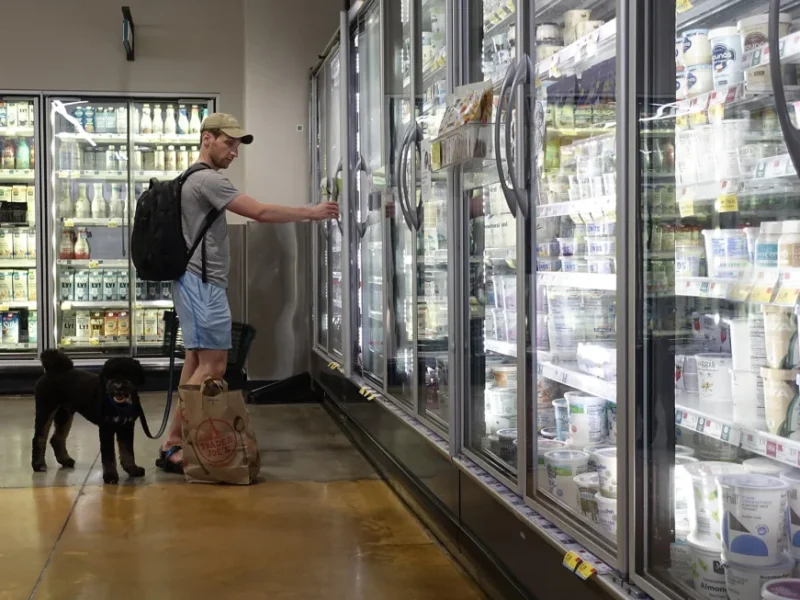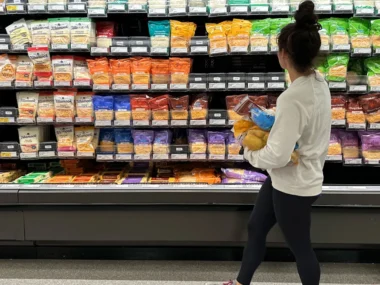Vice President Kamala Harris has taken up President Joe Biden’s stance on combating “greedflation,” the idea that corporate profit-taking during the inflation crisis inflated prices by increasing costs or reducing product sizes.
Is there any validity to this? Partially.
Harris acknowledged that while pandemic-induced supply chain disruptions drove up prices, improvements in supply chains have not led to lower prices. She noted that major food companies are experiencing their highest profits in two decades, and while some grocery chains are passing on savings, others are not.
She conceded that most businesses are beneficial, but stressed that those not adhering to fair practices need to be addressed.
However, Harris and Biden’s focus on greedflation overlooks key points: Consumers significantly impact prices, corporate greed was not a main driver of inflation, and the battle against inflation is largely won.
Profits have increased, but they’ve actually been higher in recent years.
While major food companies are indeed making substantial profits, some have reported even higher profits in years when inflation was lower.
For example, PepsiCo made $9.1 billion in profit last year, up from $7.1 billion in 2020, but still below the $12.5 billion earned in 2018 when inflation was below 3%. Similarly, Kroger’s 2018 profits surpassed those of 2023.
Kraft Heinz earned $10.9 billion in 2017, nearly four times its profit last year.
Harris’ assertion isn’t entirely accurate, though there are instances where recent price hikes have boosted corporate profits. For instance, Cal-Maine Foods saw its revenue and profits soar due to higher egg prices.
A Harris-Walz campaign spokesperson stated, “Vice President Harris believes it is wrong for bad actors to profit excessively from increased consumer prices.”
Demand and Supply
Before criticism mounts, let’s be clear: Wall Street operates with profit in mind. Companies often find ways to profit off customers, and practices like shrinkflation—reducing product size while keeping prices the same—are common. Greedflation is real, with the San Francisco Fed noting unusual price increases in some sectors during the 2021 inflation surge.
However, the U.S. economy is vast, and corporate profit-taking wasn’t a major inflation driver, according to the same Fed study. Price markups in certain areas weren’t unusual, and overall, greedflation had minimal impact. Basic economics—supply and demand—dictates prices more than corporate actions alone.
Current retail trends highlight this: Companies like Target and Starbucks are lowering prices due to reduced consumer spending, and increased rental housing supply has led to lower rents and incentives from landlords. Supply and demand remain fundamental economic principles.
What caused the inflation crisis
Inflation surged due to several factors. Covid disrupted global production, causing supply and demand issues. Many countries, including the U.S., halted economies briefly and injected trillions in stimulus, boosting consumer spending.
The Federal Reserve lowered interest rates to near-zero for two years, encouraging home purchases and refinances at historically low rates, which drove up prices.
Russia’s Ukraine invasion worsened global supply chain issues and increased prices, while Middle Eastern instability briefly pushed oil prices higher.
Inflation is no longer the primary concern.
Though high prices still concern Americans, inflation is no longer the main issue. Inflation has decreased significantly, falling below 3% from a previous 9% spike. The Fed’s preferred measure is nearing its 2% target.
Efforts to combat “greedflation” and price gouging may be counterproductive. Economists suggest that price caps could cause more problems. While regulations are necessary, the battle against inflation is largely over, and further actions might have limited impact.











